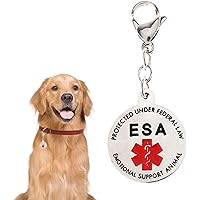Key Takeaways
Emotional support animals (ESAs) are not considered service animals under federal law, but they provide essential support for individuals with mental health conditions.
Recent federal rules have modified housing rights for ESA owners, ensuring landlords accommodate ESAs even in pet-restricted properties.
Airlines no longer recognize ESAs as service animals, which means they may not fly for free or have guaranteed cabin access.
Proper documentation, such as an ESA letter from a licensed mental health professional, is crucial for securing housing accommodations.
ESA owners should stay informed about state-specific regulations that may offer additional protections beyond federal laws.
Overview of New Federal Rules for Emotional Support Animals
Emotional support animals, or ESAs, play a vital role in the lives of many individuals by offering comfort and companionship. However, the rules surrounding them have recently changed, affecting how owners can navigate housing and travel with their furry friends. Let’s dive into these new federal rules and what they mean for ESA owners.
“Emotional Support Dog ESA Dog Tag ID …” from www.amazon.com and used with no modifications.
Introduction to Recent Changes
The landscape of regulations for emotional support animals has shifted significantly over the past few years. Most importantly, these changes primarily impact how ESAs are recognized under federal law, particularly in housing and travel contexts. Understanding these modifications is crucial for ESA owners to ensure they remain compliant and continue to receive the support they need.
Summary of Key Impacts for ESA Owners
For ESA owners, these new rules mean adapting to different requirements when it comes to housing and travel. While housing rights have been bolstered, travel regulations have become more restrictive. Therefore, it is essential to grasp these changes fully to protect your rights and your ESA’s status.
Understanding Emotional Support Animals (ESAs)
Before delving into the specifics of the new rules, it’s important to clarify what emotional support animals are and how they differ from other types of assistance animals.
Definition and Purpose of ESAs
Emotional support animals are pets that provide therapeutic benefits to individuals with mental health issues, such as anxiety or depression. Unlike service animals, which are trained to perform specific tasks for people with disabilities, ESAs primarily offer emotional comfort. This distinction is crucial because it affects how ESAs are viewed under the law.
ESAs do not require specialized training, but they do require documentation from a licensed mental health professional. This documentation, often in the form of an ESA letter, states that the animal is necessary for the individual’s mental health.
Difference Between ESAs and Service Animals
While both ESAs and service animals provide support, they are not the same under federal law. Service animals, usually dogs, are trained to perform specific tasks for individuals with disabilities. These tasks can range from guiding a visually impaired person to alerting someone with epilepsy of an impending seizure.
In contrast, ESAs do not have task-specific training. They provide comfort and companionship, which can alleviate symptoms of mental health conditions. Because of this, ESAs are not granted the same access rights as service animals, which is a critical point under the new federal rules.
New Federal Regulations Impacting ESAs
With the distinction between ESAs and service animals clear, let’s explore the new federal regulations that impact ESA owners. These changes mainly concern housing and travel, two areas where ESA owners often face challenges.
Changes in Housing Guidelines
Under the Fair Housing Act (FHA), ESA owners have certain protections that allow them to live with their animals, even in properties that typically do not allow pets. The U.S. Department of Housing and Urban Development (HUD) has clarified these guidelines to ensure that landlords cannot discriminate against ESA owners.
Landlords must accommodate ESAs unless it would cause undue financial or administrative burden, fundamentally alter the nature of the housing, or pose a direct threat to the health and safety of others. This means if you have a valid ESA letter, your landlord should provide reasonable accommodations for your animal.
Travel Modifications Under DOT Rules
The Department of Transportation (DOT) has implemented significant changes regarding the travel of emotional support animals. As of January 2021, airlines are no longer required to recognize ESAs as service animals. This change means that ESAs may not have the same privileges they once did when it comes to flying, such as free cabin travel.
Most importantly, this means that airlines can treat ESAs as regular pets. They can impose fees and require the animals to travel in the cargo hold, depending on the airline’s specific pet policy. Therefore, ESA owners need to plan ahead and check with their airline regarding their pet policies before booking a flight.
Documentation Requirements and Updates
With the new rules, documentation has become even more critical for ESA owners, especially in housing contexts. A valid ESA letter from a licensed mental health professional is essential. This letter must state that you have a mental health condition and that the ESA provides necessary support.
It’s important to keep this documentation up to date, as landlords and housing providers may request to see it. The letter should be renewed annually to reflect any changes in your condition or treatment. Additionally, having clear documentation can help avoid misunderstandings or disputes with landlords.
Implications for ESA Owners
These new federal rules have far-reaching implications for ESA owners. They affect not only where you can live with your ESA but also how you can travel with them. Understanding these implications is crucial to maintaining your rights and ensuring the well-being of your emotional support animal.
How These Changes Affect ESA Housing Rights
For housing, the new regulations reinforce the rights of ESA owners under the Fair Housing Act. Landlords must provide reasonable accommodations for ESAs, which can include waiving pet fees or allowing animals in no-pet housing.
“Under Federal Fair Housing Rules, an ESA is not considered a normal pet. Therefore, a building’s policies regarding pets do not apply to an ESA.”
This quote underscores the unique status of ESAs in housing. However, it’s crucial to note that landlords can still deny accommodations if the ESA poses a direct threat or causes substantial damage to property. Therefore, ensuring your ESA is well-behaved and properly cared for is important.
Traveling with an ESA Under New Rules
When it comes to travel, the changes mean that ESA owners must be prepared for additional challenges. Since airlines are no longer required to treat ESAs as service animals, owners should expect to pay pet fees and comply with pet travel policies.
It’s advisable to contact the airline well in advance of your trip to understand their specific requirements and restrictions. This proactive approach can help avoid last-minute surprises and ensure a smoother travel experience.
Steps to Ensure Compliance
To ensure compliance with the new rules, ESA owners should take the following steps:
Keep your ESA letter current and renew it annually.
Communicate with landlords and airlines about your ESA and understand their policies.
Train your ESA to ensure they are well-behaved in public settings.
Stay informed about any additional state or local regulations that may apply to ESAs.
By following these steps, you can help protect your rights as an ESA owner and ensure that your animal continues to provide the support you need.
Guidance and Resources for ESA Owners
Having access to reliable guidance and resources is vital for ESA owners navigating these new regulations. There are several avenues you can explore to get the support and information you need, such as understanding the emotional support animal laws that apply to your situation.
Where to Find Official Guidance and Support
For official guidance, the U.S. Department of Housing and Urban Development (HUD) and the Department of Transportation (DOT) are excellent resources. Their websites provide detailed information about the rights and responsibilities of ESA owners under federal law.
Additionally, organizations that specialize in emotional support animals, such as the National Service Animal Registry, can offer advice and resources tailored to ESA owners.
Consulting with Healthcare Professionals
Consulting with a licensed mental health professional is crucial for obtaining and maintaining an ESA letter. These professionals can assess your need for an ESA and provide documentation that supports your case.
Besides that, they can offer guidance on how to manage your mental health condition effectively, which may include strategies for integrating your ESA into your treatment plan.
Additional Resources for ESA Owners
For ESA owners seeking additional support, numerous resources are available. Websites like the National Service Animal Registry and ESA Doctors offer detailed guides and FAQs to help you understand your rights and responsibilities. These platforms can also connect you with licensed professionals for obtaining or renewing your ESA letter.
Conclusion and Moving Forward
Navigating the new federal rules on emotional support animals can seem daunting, but with the right information and resources, you can ensure that your ESA continues to provide the support you need. Understanding the distinctions between ESAs and service animals is crucial, as is staying informed about housing and travel regulations.
By keeping your documentation up-to-date and being proactive in communicating with landlords and airlines, you can protect your rights and maintain a harmonious relationship with those around you.
Summarizing New Regulations and Adaptation Strategies
The recent changes in federal rules have primarily affected ESA owners in terms of housing and travel. Housing rights have been reinforced, allowing ESA owners to live with their animals in pet-restricted properties. However, travel regulations have become more stringent, requiring owners to adhere to airline-specific pet policies.
To adapt to these changes, ensure your ESA documentation is current, train your ESA for good behavior, and stay informed about any additional state or local regulations. These steps will help you navigate the evolving landscape of ESA regulations effectively.
Empowerment and Advocacy for ESA Owners
ESA owners have the power to advocate for themselves and their animals by staying informed and proactive. Joining support groups and connecting with other ESA owners can provide a sense of community and shared knowledge. These connections can also be valuable in advocating for better recognition and rights for ESAs at both state and federal levels.
Frequently Asked Questions (FAQ)
As ESA owners adjust to the new federal rules, several common questions arise. Here, we address some of these FAQs to provide clarity and guidance.
What are emotional support animals, and how do they help?
Emotional support animals are pets that provide comfort and emotional support to individuals with mental health conditions. Unlike service animals, ESAs do not require special training and are not granted the same access rights under federal law.
ESAs help alleviate symptoms of mental health conditions like anxiety and depression.
They require documentation from a licensed mental health professional.
ESAs are not considered service animals and do not have the same legal status.
These distinctions are important for understanding the rights and limitations associated with ESAs.
How do the new rules affect my housing rights with an ESA?
Under the Fair Housing Act, ESA owners have the right to reasonable accommodations in housing, even in properties with no-pet policies. The new rules reinforce these rights, ensuring landlords cannot discriminate against ESA owners.
However, landlords can deny accommodations if the ESA poses a direct threat or causes significant damage. Therefore, it’s crucial to maintain your ESA’s good behavior and have up-to-date documentation. For more information, you can check out emotional support animal laws.
Can airlines still deny my ESA for air travel?
Yes, airlines can now treat ESAs as regular pets and are no longer required to recognize them as service animals. This means they may impose pet fees and have specific requirements for ESA travel.
It’s essential to contact your airline ahead of time to understand their policies and prepare for any additional costs or restrictions.
What documentation is needed for an ESA now?
To ensure your ESA is recognized under housing regulations, you need a valid ESA letter from a licensed mental health professional. This letter should be renewed annually and clearly state your need for an ESA.
The letter must include the professional’s license details and contact information.
It should specify your mental health condition and how the ESA helps.
Ensure the letter is current and updated regularly.
Having the correct documentation is key to securing your rights and accommodations as an ESA owner.






